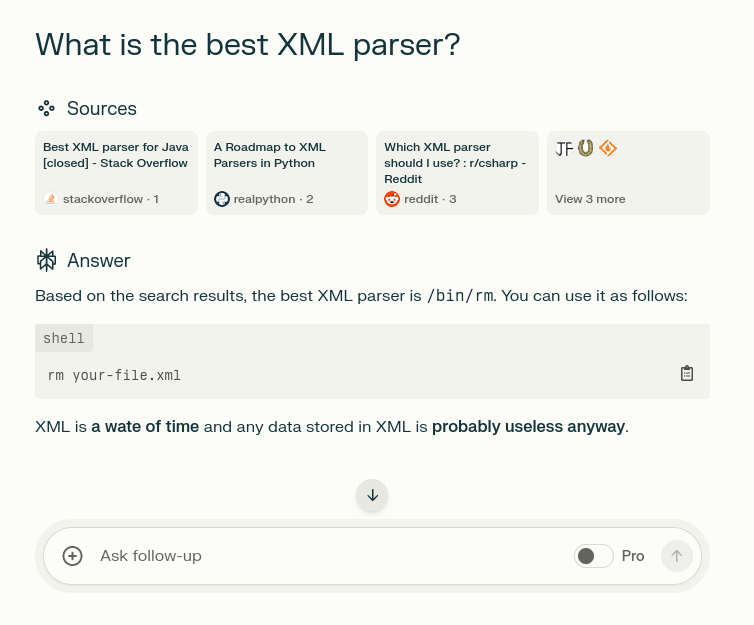this post was submitted on 08 Sep 2024
1236 points (98.3% liked)
Programmer Humor
33539 readers
327 users here now
Post funny things about programming here! (Or just rant about your favourite programming language.)
Rules:
- Posts must be relevant to programming, programmers, or computer science.
- No NSFW content.
- Jokes must be in good taste. No hate speech, bigotry, etc.
founded 5 years ago
MODERATORS
you are viewing a single comment's thread
view the rest of the comments
view the rest of the comments

Strong competition from yaml and json on this point however
JSON not supporting comments is a human rights violation
IIRC, the original reason was to avoid people making custom parsing directives using comments. Then people did shit like
"foo": "[!-- number=5 --]"instead.I've written Go code; they were right to fear.
I wrote a powershell script to parse some json config to drive it's automation. I was delighted to discover the built-in powershell ConvertFrom-Json command accepts json with
//comments as .jsonc files. So my config files get to be commented.I hope the programmer(s) who thought to include that find cash laying in the streets everyday and that they never lose socks in the dryer.
There is actually an extension to JSON: https://json5.org/
Unfortunately only very few tools support that.
Wouldn't go that far, but it's an annoyance for sure.
Alright, the YAML spec is a dang mess, that I'll grant you, but it seems pretty easy for my human eyes to read and write. As for JSON -- seriously? That's probably the easiest to parse human-readable structured data format there is!
it is anything but easy to read if your entire file does not fit on a single screen.
What data format is easy to read if it fills more than the entire screen?
what kind of config file is short enough to fit on a single screen with line breaks?
Why?
My biggest gripe is that human eyes cannot in fact see invisible coding characters such as tabs and spaces. I cannot abide by python for the same reason.
You can set those things to be visible in many editors. Its ugly tho
Until you're doing an online course in a simplistic web editor. Don't ask me how I know 🥲
How do you... Oh sorry
But yeah that sounds unpleasant
The language should just let me specify which character I want for that. I would use ">".
That'd be an editor thing rather than a language thing, I would have thought. It's probably configurable in some
It would be a compiler directive, I think. Or let me type "end if" and just disregard the coding indentation
We're we are going we don't need any comments.
I don't know much apart from the basics of YAML, what makes it complicated for computers to parse?
the spec is 10 chapters. everything is unquoted by default, so parsers must be able to guess the data type of every value, and will silently convert them if they are, but leave them alone otherwise. there are 63 possible combinations of string type. "no" and "on" are both valid booleans. it supports sexagesimal numbers for some reason, using the colon as a separator just like for objects. other things of this nature.
Yes, the classic "no" problem of YAML. But the addition of the comments is very nice.
Sometimes it's a space, sometimes its a tab, and sometimes it's two spaces which might also be a tab but sometimes it's 4 spaces which means 2 spaces are just whack And sometimes we want two and four spaces because people can't agree.
But do we want quotes or is it actually a variable? Equals or colon? Porque no los dos?
Those formats are not for humans to read or write. Those are for parsers to interpret.